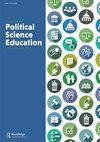高层次政治理论课教学改革研究
IF 0.6
Q3 POLITICAL SCIENCE
引用次数: 0
摘要
摘要:本文介绍了三门采用“不分级”教学法的高级课程的定性学生反思结果。这是一种强调学生学习和自我评价的教学法,省略了量化分数,代之以学生自我评价和定义课程分数的结构。这项工作借鉴了学生反思和个人对课程设计和结果的评论,作为对教学法的全面反思。这些反思的目的是提出使用这种系统的优点和挑战,并为对其他评分方案感兴趣的教师提供第一手资料。总体而言,学生们发现不评分一开始令人担忧,但最终是有益的。学生作业得到改善,个别学生反思课堂的创新性质,为未来的迭代提供具体建议。本文章由计算机程序翻译,如有差异,请以英文原文为准。
A Study of Ungrading in Upper-level Political Theory Courses
Abstract This paper presents results from qualitative student reflections from three upper-level courses taught using the “ungrading” pedagogy. This is a pedagogy that emphasizes student learning and self-evaluation by omitting quantitative grades, replacing them with a structure where students evaluate themselves and define their own grades for the course. This work draws on comments taken from student reflections and personal accounts of the course design and outcomes presented as a comprehensive reflection on the pedagogy. The goal of these reflections is to present the advantages and challenges of using such a system and a firsthand account for instructors who are interested in alternative grading schemes. Overall, students found ungrading to be initially worrying, but ultimately rewarding. Student work improved and individual students reflected on the innovative nature of the class, providing concrete suggestions for future iterations.
求助全文
通过发布文献求助,成功后即可免费获取论文全文。
去求助
来源期刊

Journal of Political Science Education
POLITICAL SCIENCE-
CiteScore
1.80
自引率
36.40%
发文量
69
期刊介绍:
The Journal of Political Science Education is an intellectually rigorous, path-breaking, agenda-setting journal that publishes the highest quality scholarship on teaching and pedagogical issues in political science. The journal aims to represent the full range of questions, issues and approaches regarding political science education, including teaching-related issues, methods and techniques, learning/teaching activities and devices, educational assessment in political science, graduate education, and curriculum development. In particular, the journal''s Editors welcome studies that reflect the scholarship of teaching and learning, or works that would be informative and/or of practical use to the readers of the Journal of Political Science Education , and address topics in an empirical way, making use of the techniques that political scientists use in their own substantive research.
 求助内容:
求助内容: 应助结果提醒方式:
应助结果提醒方式:


